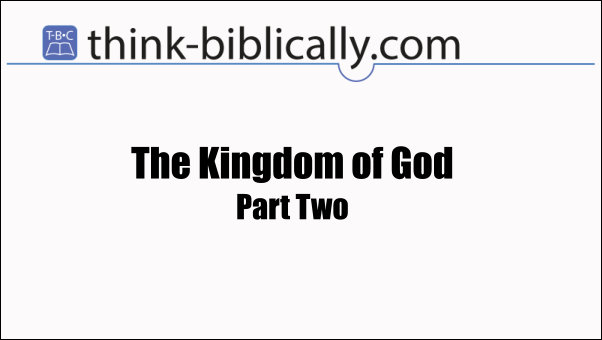By Tyson Thorne

“The kingdom of heaven is like..." Jesus begins many parables in this fashion, signaling us to pay attention and learn about our homeland. In these parables we can expect to learn at least one truth regarding either the realm inside of which God's authority is recognized, the people who enter that realm, and/or the effect that authority has upon the people and the realm. There are many "Kingdom Parables" in the New Testament, the majority of which are repeated between Matthew, Mark and Luke. Let us look at one in particular that happens to appear only in Matthew 13.24-30.
Before looking at the parable it is important to understand what the Kingdom of God is. The kingdom of God is all about the "rule of God", or the "authority of God". This kingdom had its origins in the original creation, possibly even before then, but it was re-inaugurated when Jesus was baptized by John the Baptist, it came in power at Pentecost, it grows today through the church, and will be consummated when every knee bends and every tongue confesses that Jesus is Lord of All. It is the promise of the new covenant. This is a very brief summary, and entire books could be written on the subject, but we will try to keep to the basics for the purpose of our study. Now, on to the parable:
“The kingdom of heaven is like a person who sowed good seed in his field. But while everyone was sleeping, an enemy came and sowed darnel among the wheat and went away. When the plants sprouted and produced grain, then the darnel also appeared. So the slaves of the landowner came and said to him, ‘Sir, didn’t you sow good seed in your field? Then where did the darnel come from?’ He said, ‘An enemy has done this!’ So the slaves replied, ‘Do you want us to go and gather it?’ But he said, ‘No, since in gathering the darnel you may uproot the wheat along with it. Let both grow together until the harvest. At harvest time I will tell the reapers, “First collect the darnel and tie it in bundles to be burned, but then gather the wheat into my barn.”’”
At the disciples request, Jesus explains the parable in Matthew 13.37-43. In that passage Jesus defines terms. The sower is "the Son of Man", one of Jesus' favorite references for himself. The "field" is the entire planet. Jesus-followers are the good seed, and everyone else (because they intentionally or unintentionally sided with Satan) is the bad seed. The enemy of Jesus is, as always, Satan, and the reapers are angels.
A note in the NET version of this passage explains why they specified "darnel" as the bad seed instead of choosing the more generic term "weeds" or "tares":
Darnel, an especially undesirable weed that bears an uncanny resemblance to wheat until the ears of grain appear. So close is the resemblance to genuine wheat that darnel is sometimes called “false wheat.” Darnel is considered poisonous; ingesting the weed causes feelings of drunkenness and can prove fatal.
The implications of this teaching cannot be understated. First, it can be hard to identify who some of the enemy are. It takes diligence on the part of the Jesus-follower to know who to trust, or even who to marry. This fits with Jesus' teaching earlier in Matthew's gospel (7.21-23) about Judgment Day, when many will claim to be followers of Jesus only to learn that they never knew him. There are many pretenders in the world, and they can harm true believers, bringing us to the next observation.
While Christian impostors can damage those in the Kingdom, judging them early may cause even greater damage to the growth of God's kingdom. For now, Jesus argues, it is best to leave them in place to grow alongside the church. Their judgment will come, but at a time when the least amount of damage will be done. All true members of the kingdom should remember this, that we can be hurt by those who claim to know Jesus, and not let it shake our faith in the authority of God. He has left these people in place for a reason. This is not to say that we cannot do our own weeding, Matthew 18.15-20 describes a process of church discipline that helps us identify the wheat from the darnel.
The third observation is that being a part of God's Kingdom doesn't guarantee that we will not suffer or be hurt by the sins of others — even by those we think are inside the church. When such pain is inflicted, we ought to remember that God allows such distress but the pain is still less than it could have been. God leaves these people in the "field" so that their harm can be limited, that we might grow up strong, and so that God can one day justly sentence them to their eternal fate.
